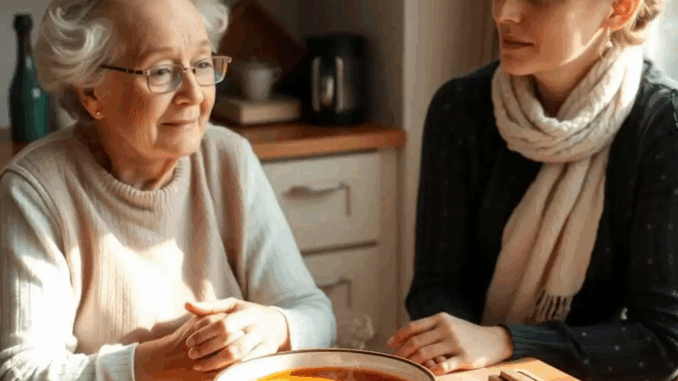

Today I’m just ordering a bowl of soup.
I’m seventy-seven years old, and I’ve reached the day when I ask my daughter-in-law, Lucía, for just a bowl of soup. Until not long ago, I believed her duties were to keep the house clean, cook, do chores, and take care of the family, as I once did. But life changed, and I, Carmen Alonso, realized that my expectations were a thing of the past. My son Javier and Lucía welcomed me into their home, and now I live here, feeling like a cross between a guest and a burden. My heart aches at this thought, but I try to accept reality, even though resentment still burns inside.
There was a time when I owned a large house. I would get up at the crowing of the rooster, prepare stews, bake empanadas, sew curtains, and raise Javier. My husband, may he rest in peace, worked in the factory, and I kept the house in order so he could return to the warmth of home. I thought that’s how it should be: the wife, guardian of the hearth, and the daughter-in-law, when the time came, would continue those traditions. When Javier brought Lucía home, I hoped she would be like a daughter, that we would share chores and recipes, like in the old days. But everything was different.
Lucía is a modern woman. She works in an office, is always on her cell phone, dresses fashionably, and hardly cooks. When they got married, I was still living in my apartment, but two years ago my health began to fail—my legs were failing me, the dizziness wouldn’t stop. Javier insisted: “Mom, come with us, you’ll be better.” I agreed, sold my apartment so I wouldn’t be a burden, and gave them the money to renovate their house. I thought I would help in any way I could, but Lucía didn’t want my help… or my expectations.
From day one, I noticed she doesn’t like me getting involved in the kitchen. Once, I offered to make a stew, the way Javier likes it, and she smiled: “Carmen, don’t worry, I’ll order something through the app, it’ll be faster.” Ordering? For me, food is about care, not a click on a screen. I tried to clean, but Lucía stopped me: “No need, we have a robot vacuum.” A robot? Where’s the soul, the warmth? I kept quiet, but inside, the feeling of being unnecessary grew. Javier just shrugged: “Mom, Lucía will take it, rest.” Rest? At seventy-seven, resting isn’t about doing nothing, but about feeling useful.
What hurts most is her attitude. I always believed that a daughter-in-law should respect her mother-in-law, help her, and listen to her advice. But Lucía does things her way. She makes salads with avocado, not the meatballs I taught her. Her house is clean, but cold—without those details that make it come alive: no embroidery on the tablecloths, no scent of freshly baked bread. Once I suggested: “Lucía, shall we make an empanada? Javier loves tuna empanadas.” And she replied: “Carmen, we eat less flour now; it’s because of our diet.” Diet? And what does the soul eat?
I started to resent him. I thought he didn’t respect me, that he didn’t value my experience. I spoke to Javier: “Son, your wife doesn’t run the house, everyone asks for everything, everything is done on their cell phones. Is that what a family is like?” But he simply said: “Mom, don’t exaggerate, we’re fine.” Fine? Maybe for them, we are, but I feel like a piece of furniture in the corner. A neighbor, when I complained, told me: “Carmen, times change, daughters-in-law aren’t like they used to be.” But I don’t want to blame time. I want them to see me, not just feed me and put me to bed.
A few days ago, I realized I couldn’t take it anymore. Lucía was preparing dinner—something with chicken and a strange sauce. I was in my room, listening to Javier and her laughing, and suddenly I felt like an outsider. I got up, went to the kitchen, and said, “Lucía, will you make me a bowl of soup? Simple, just the way I like it, with potatoes.” She was surprised, but nodded: “Okay, Carmen, I’ll make it tomorrow.” And yesterday she brought it to me—a normal, warm soup, almost like mine. I ate it and almost cried. Not because of the taste, but because I understood: this is all I ask for now. No chores, no advice, not my rules—just a bowl of soup.
I realized my hopes were for another life. Lucía won’t be like me, and maybe that’s not bad. She works, she gets tired, and at my age, I can no longer dictate how they live. But it hurts not to be needed like before. Javier loves me, I know, but he’s busy with his own life. And I sit in his house thinking: Where is that woman who managed everything? All that’s left is an old woman asking for soup.
I’ve decided not to give up. I’ll learn to live differently: I’ll watch my soap operas, take walks in the park, call my old friends. Maybe I’ll ask Lucía to teach me how to order food on my cell phone—who knows? But I don’t want to be a burden. If they don’t see me as a mother or a grandmother, I’ll find a reason to live. For now, I’m just asking for a bowl of soup… and, maybe, a little of the warmth I miss so much.
**Lesson learned:** Holding on to the past only embitters the present. Sometimes, acceptance is the only solace we have left.
Để lại một phản hồi